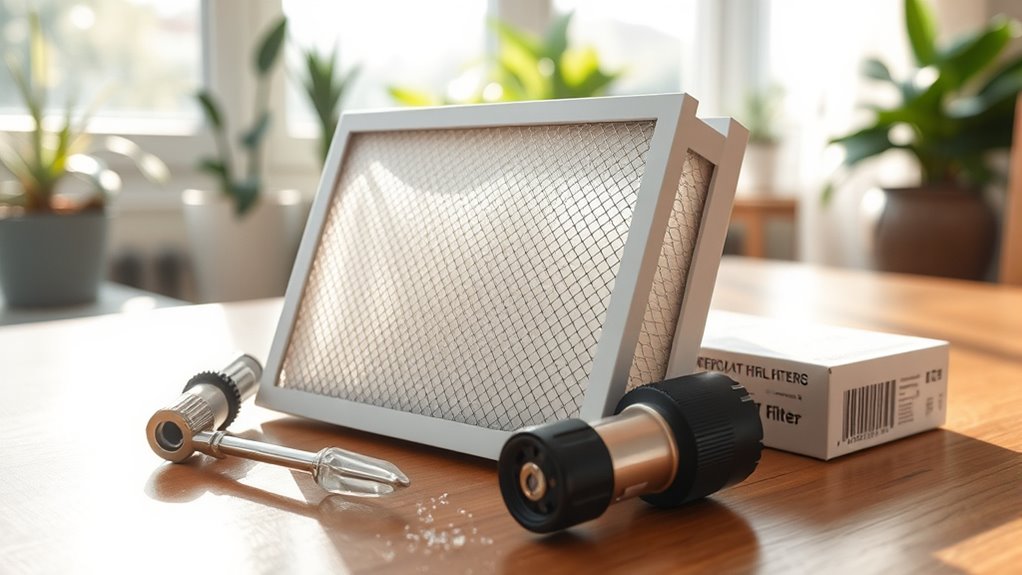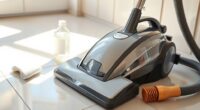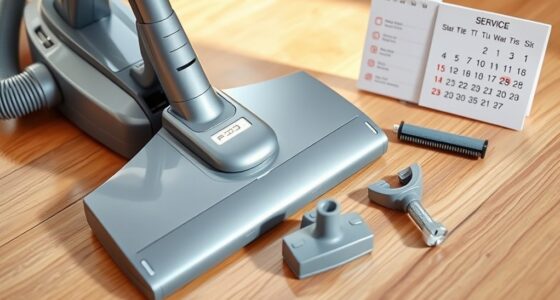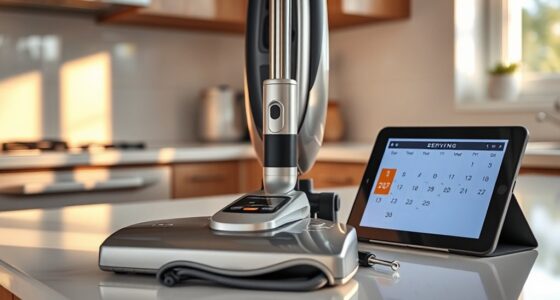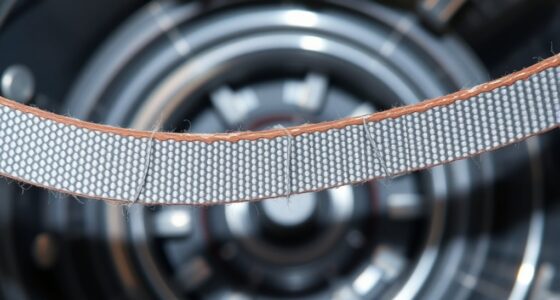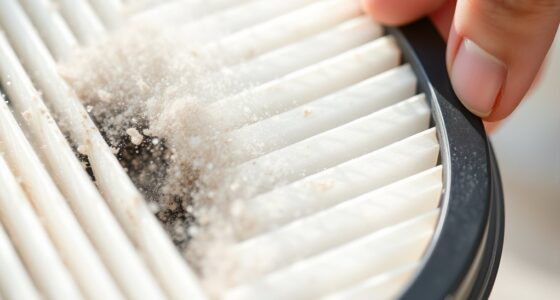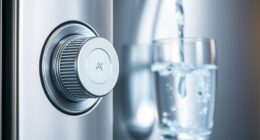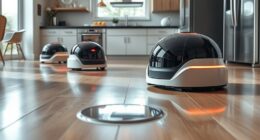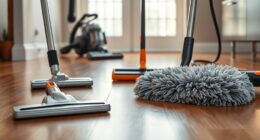HEPA filters are essential for improving air quality, capturing 99.97% of airborne particles. To maintain them, check for dirt and clogs regularly and replace them every 6 to 12 months. Using pre-filters can extend their lifespan, while keeping your air purifier clean helps optimize performance. Look for signs like reduced airflow or unpleasant odors, which indicate it’s time for a change. There’s more to learn about effective maintenance and disposal practices that can help you maximize their benefits.
Key Takeaways
- HEPA filters capture at least 99.97% of airborne particles, making them essential for improving indoor air quality.
- Regular maintenance, including inspections and timely replacements every 6 to 12 months, ensures optimal performance.
- Use pre-filters to trap larger particles and extend the life of your HEPA filter.
- Signs of needing replacement include decreased airflow, odors, and visible dirt on the filter surface.
- Dispose of HEPA filters responsibly, as they are non-biodegradable and can release pollutants if mishandled.
What Is a HEPA Filter?
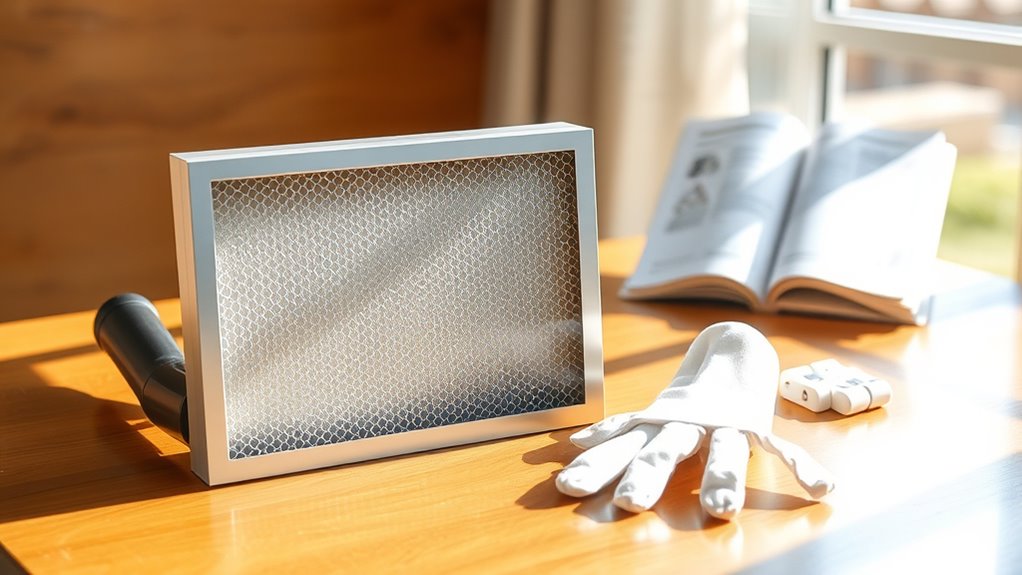
A HEPA filter, or High-Efficiency Particulate Air filter, is a powerful tool for improving your indoor air quality.
It’s designed to capture at least 99.97% of airborne particles that are 0.3 microns in diameter. This effectiveness comes from its dense mat of randomly arranged fiberglass fibers, which trap allergens, dust, and other pollutants.
You’ll find HEPA filters in air purifiers, HVAC systems, and vacuum cleaners, ensuring cleaner air in your home or workplace.
Different types of HEPA filters exist, with some rated for specialized environments like cleanrooms where even higher efficiency is necessary.
To maintain their effectiveness, you need to pay attention to proper maintenance and timely replacement; otherwise, clogged filters can reduce airflow and filtration capabilities.
Importance of HEPA Filter Maintenance
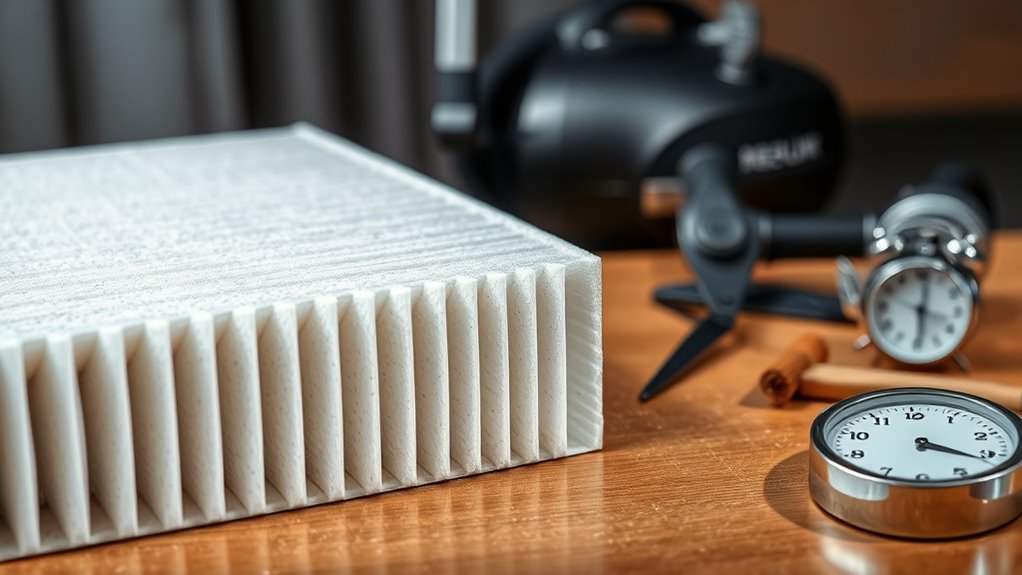
Maintaining your HEPA filter is essential for keeping the air quality in your space at its best.
Regular upkeep not only extends the filter’s lifespan but also guarantees it effectively captures harmful particles.
Ensuring Air Quality
HEPA filters play an essential role in guaranteeing indoor air quality by effectively capturing 99.97% of airborne particles as small as 0.3 microns.
To achieve better indoor air quality, you need to prioritize HEPA filter maintenance. Regular cleaning or replacement is vital for maintaining the efficiency of your air. Neglecting these tasks can lead to clogged filters that reduce airflow, increase energy costs, and strain your HVAC system.
This is especially important for individuals with allergies or respiratory conditions, as timely inspections can prevent the buildup of allergens. Additionally, using air purifiers with HEPA filters can significantly enhance your home’s air quality by removing harmful pollutants.
Establishing a routine replacement schedule, ideally every 6 to 12 months, guarantees your filters work at their best, helping you breathe easier in your home.
Extending Filter Lifespan
How can you confirm your HEPA filter lasts as long as possible?
Regular maintenance is key. By performing periodic inspections and timely replacements, you can avoid decreased efficiency and extend your filter lifespan. Typically, HEPA filters last between 6 to 12 months, depending on usage and environmental conditions.
To further enhance their longevity, consider using pre-filters to catch larger particles before they reach the HEPA filter. This reduces the load and helps maintain air quality.
Keeping your air purifiers and HVAC systems clean and debris-free can boost filter performance, potentially extending the lifespan by up to 50%.
Finally, maintain scheduled logs to track filter performance and confirm timely interventions, optimizing air quality in your space.
Benefits of Using HEPA Filters
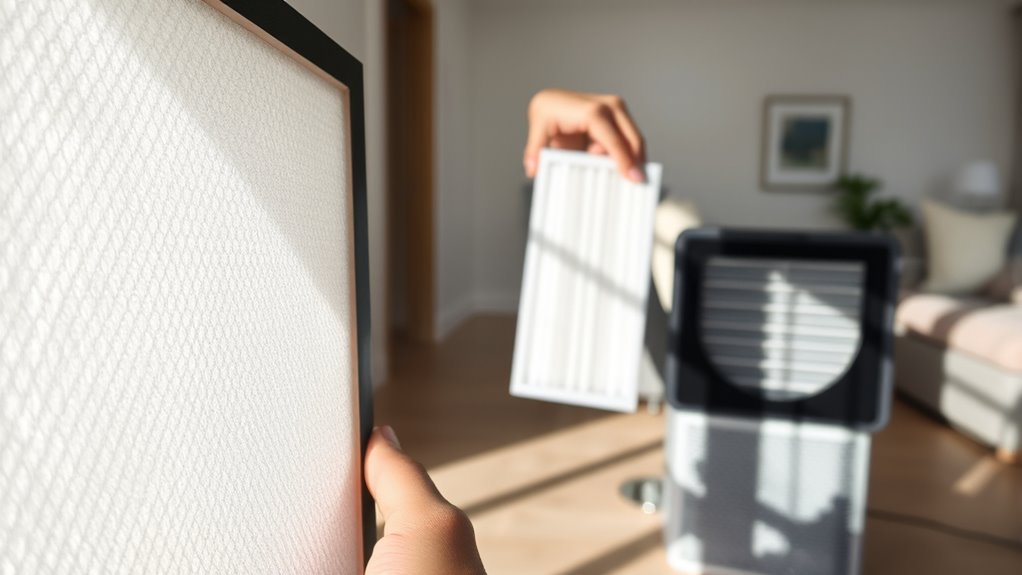
Using HEPA filters can make a noticeable difference in your indoor air quality, especially if you suffer from allergies or asthma.
These filters capture tiny particles, helping to reduce allergens and irritants in your home.
You’ll likely breathe easier and enjoy a fresher environment as a result. Additionally, HEPA filters are proven to remove 99.97% of airborne pollutants, enhancing your overall health and well-being.
Allergy and Asthma Relief
As you seek relief from allergies and asthma, consider the significant benefits of HEPA filters in your home.
These filters capture 99.97% of airborne particles as small as 0.3 microns, effectively trapping allergens like dust mites, pollen, and pet dander that trigger your symptoms. By reducing these common allergens, HEPA filters can alleviate symptoms for millions of Americans suffering from allergies.
Additionally, maintaining better indoor air quality is essential for asthma sufferers, as poor air quality can worsen respiratory issues. Research shows that homes with HEPA filtration systems experience fewer asthma attacks, leading to improved health and quality of life.
Investing in HEPA filters can create a healthier living environment for you and your loved ones.
Improved Indoor Air Quality
Clean air is crucial for a healthy home, and HEPA filters play an important role in achieving that. By capturing 99.97% of airborne particles as small as 0.3 microns, HEPA filters greatly improve your indoor air quality. This leads to fewer allergy and asthma symptoms, especially for those sensitive to pollutants. Plus, they trap smoke, odors, and particulate matter, creating a fresher atmosphere that enhances your comfort. Regular maintenance and timely replacement of HEPA filters guarantee their effectiveness, minimizing the spread of airborne pathogens and reducing illness risks.
| Benefit | Description |
|---|---|
| Allergy Relief | Reduces allergens like dust mites and pollen. |
| Odor Control | Traps smoke and unpleasant smells. |
| Health Improvement | Lowers risks of airborne illnesses. |
| Maintenance Importance | Regular checks guarantee peak performance. |
Best Practices for Maintaining HEPA Filters
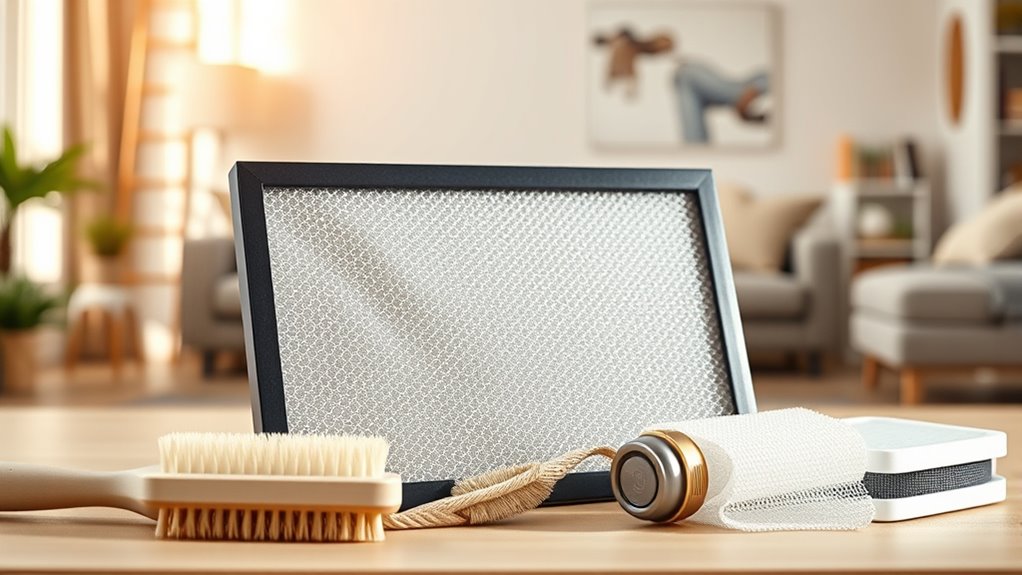
Maintaining HEPA filters is essential for ensuring they effectively capture airborne particles and enhance indoor air quality. Regularly inspect your HEPA filters for dirt, clogging, and any physical damage.
Keeping a maintenance log helps track cleaning and replacement activities, ensuring you stay compliant with air quality standards. Always use specialized tools and follow the manufacturer’s guidelines when cleaning or replacing these filters to avoid compromising their effectiveness.
Don’t forget about prefilters; monitor and replace them every 3 to 6 months to help extend the lifespan of your HEPA filters. Additionally, consider the importance of filter types as different filters can greatly influence the overall performance of your air purification system.
Timely replacement, typically every 6 to 12 months, is vital to prevent decreased airflow and increased energy costs while ensuring the best air purification in your space.
Signs Your HEPA Filter Needs Replacement
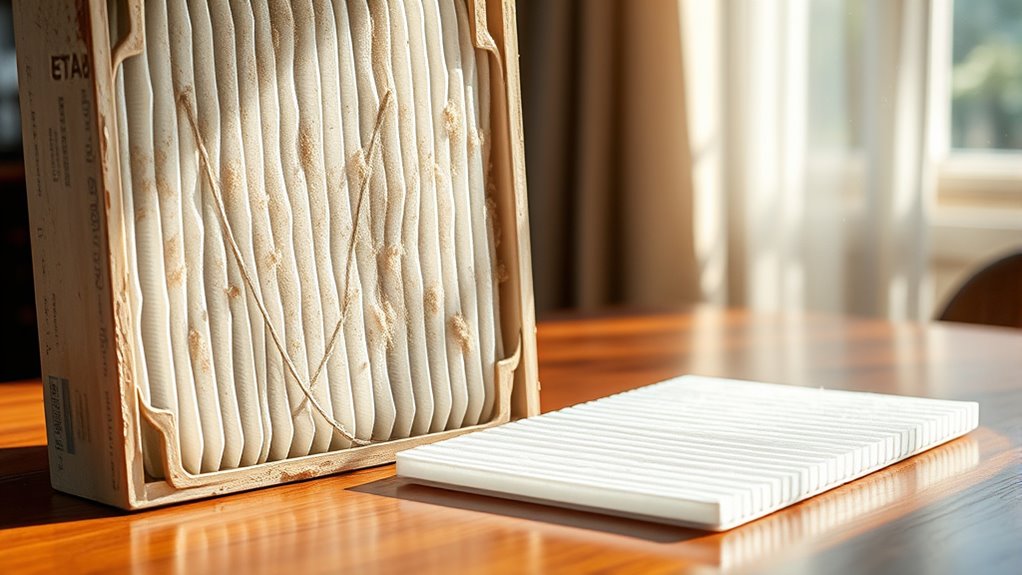
When your HEPA filter starts to show signs of wear, it’s essential to recognize the indicators that signal it needs replacement.
If you notice decreased performance, such as poorer air quality or reduced airflow from your air purifier, it’s time to act. Increased noise levels can mean the filter is clogged, indicating it’s working harder than usual.
Visual cues like a dirty or discolored filter surface also suggest it’s reached capacity. Additionally, if you detect unpleasant odors from your air purifier or HVAC system, it may be harboring trapped pollutants.
Finally, frequent allergy symptoms or noticeable dust accumulation in your space are key signs that it’s time to replace a HEPA filter for peak performance.
How to Choose the Right HEPA Filter
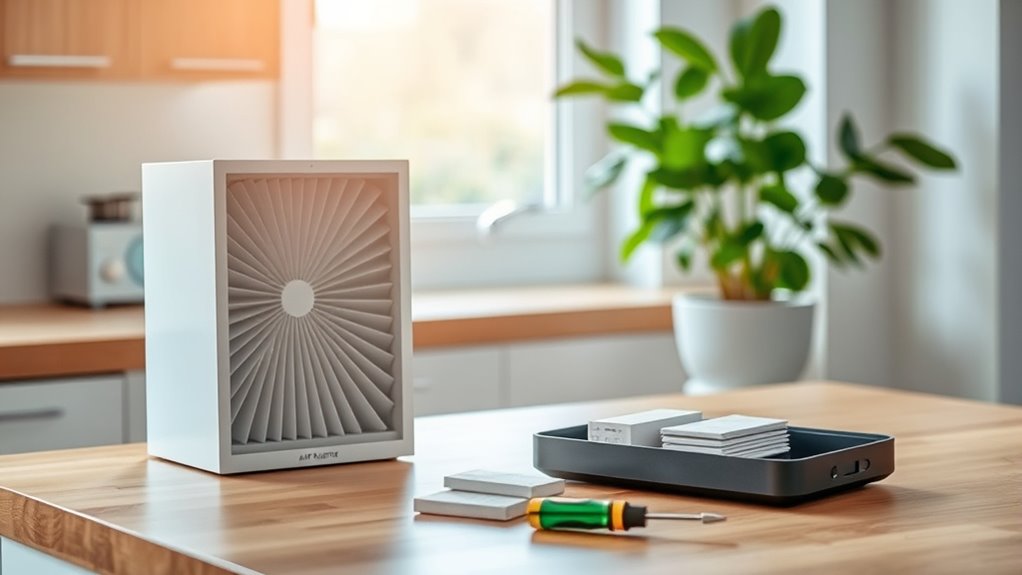
How do you guarantee you’re choosing the right HEPA filter for your needs? First, make sure you select a true HEPA filter that captures at least 99.97% of particles as small as 0.3 microns, guaranteeing effective air purification.
Next, check the MERV rating; aim for a rating between 13 and 16 for ideal filtration efficiency and airflow in residential settings.
Verify that the filter is compatible with your air purifier or HVAC system, as sizes and requirements can vary.
Establish a filter change schedule based on usage, typically every 6 to 12 months, adjusting for environmental factors.
Finally, consider the noise levels of the system, especially if it’s for quieter spaces like bedrooms or offices.
Steps to Replace a HEPA Filter
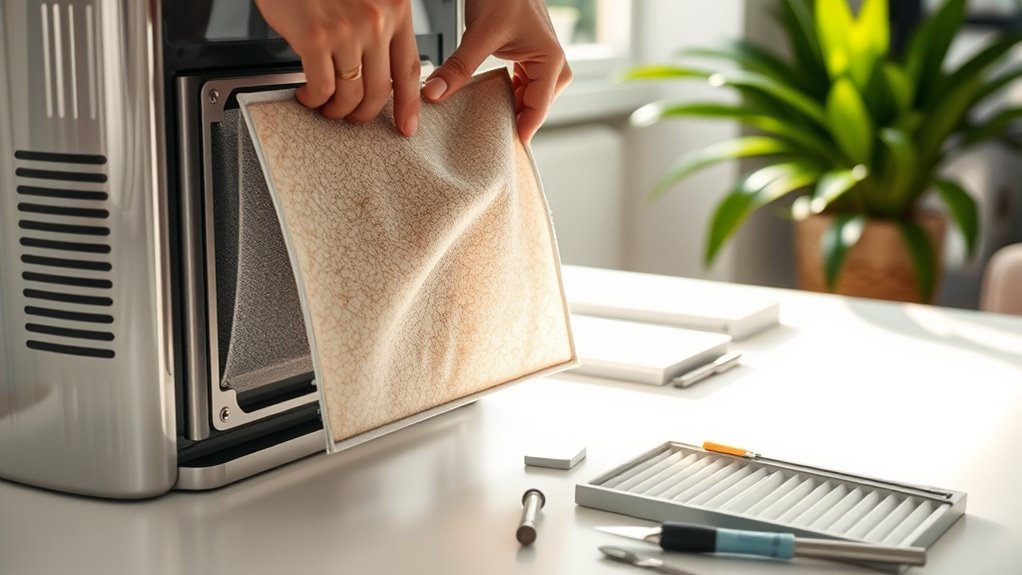
Replacing a HEPA filter is a straightforward process that keeps your air purifier or HVAC system running efficiently.
First, turn off and unplug your device to guarantee safety. Locate the filter compartment, usually behind a removable panel, and carefully remove the old HEPA filter. Dispose of it in a garbage bag to prevent the release of trapped particles into the air.
Ensure safety by turning off and unplugging your device before removing and disposing of the old HEPA filter.
Before inserting the new filter, clean the interior with a soft, dry cloth for proper maintenance. Next, install the new HEPA filter in place, making sure it fits snugly.
Close the compartment, and if your device has a filter indicator, reset it. Verify everything is sealed correctly to maintain peak efficiency and air quality.
Tools Needed for HEPA Filter Maintenance
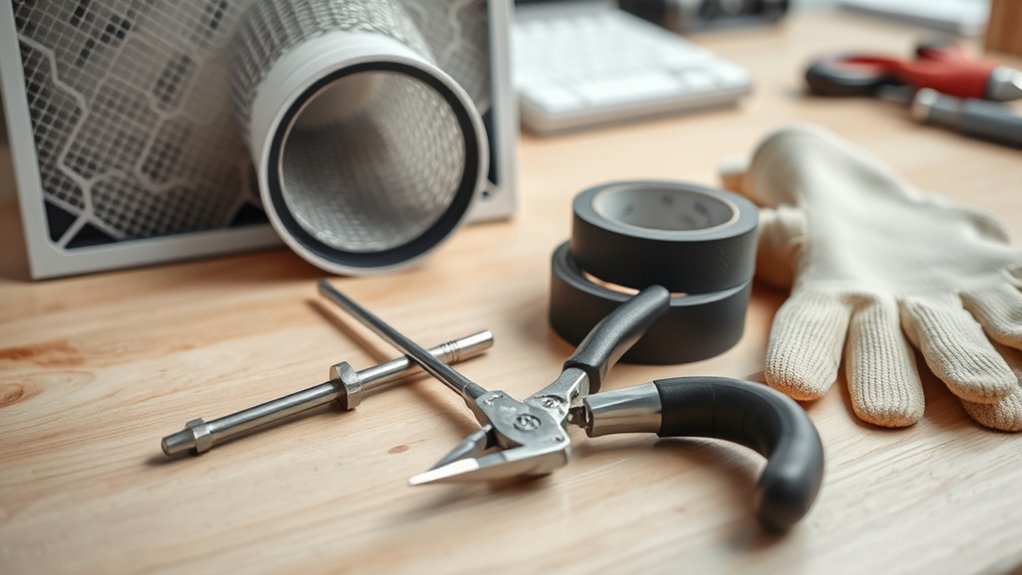
To maintain your HEPA filter effectively, you’ll need a few essential tools.
Grab a vacuum cleaner with a brush attachment, a soft cloth, and possibly a screwdriver to access the filter compartment.
Don’t forget safety gloves to protect your hands from allergens while you work.
Essential Maintenance Tools
Maintaining your HEPA filters is essential for ideal air quality, and having the right tools on hand makes the process much easier. Here’s a list of essential maintenance tools you’ll need:
- Soft Brush: Gently removes dust and debris from washable HEPA filters without causing damage.
- Vacuum Cleaner with Brush Attachment: Effectively clears loose particles from filters before cleaning.
- Mild Detergent: Specifically formulated for HEPA filters, ensuring thorough cleaning without harsh chemicals.
- Screwdriver: Required to access the filter compartment in air purifiers or HVAC systems for proper maintenance and filter replacement.
Additionally, keep a maintenance log or checklist to track cleaning schedules and filter replacements, ensuring your HEPA filters stay in top condition.
Cleaning Supplies Required
Having the right cleaning supplies is key to keeping your HEPA filters in top shape.
Start with a vacuum cleaner equipped with a soft brush attachment to gently remove loose particles without damaging the filter. You’ll also need a soft, lint-free cloth to wipe down the filter compartment and surrounding areas, ensuring no debris contaminates your clean and healthy air.
If your HEPA filter is washable, have a mild detergent specifically designed for it, avoiding harsh chemicals that could harm the fibers. A pair of gloves will protect your hands from direct contact with trapped pollutants while handling the filter.
Finally, keep a garbage bag on hand for the safe disposal of used filters, minimizing the risk of releasing allergens back into the environment.
Safety Equipment Necessities
When it comes to HEPA filter maintenance, having the right tools can make all the difference. Proper maintenance of your air filter guarantees peak performance and longevity.
Here are some essential safety equipment items you’ll need:
- Vacuum cleaner with brush attachment: Gently cleans the filter without causing damage.
- Soft brush: Removes residual dirt while minimizing the risk of tearing.
- Mild detergent: Safe for washing non-washable filters, but verify it’s compatible.
- Screwdriver: Helps access the filter compartment for safe removal.
Don’t forget to wear gloves! They’ll prevent transferring oils or contaminants from your hands to the filter, maintaining its integrity during the cleaning process.
Proper tools lead to better air quality.
Environmental Considerations for HEPA Filter Disposal
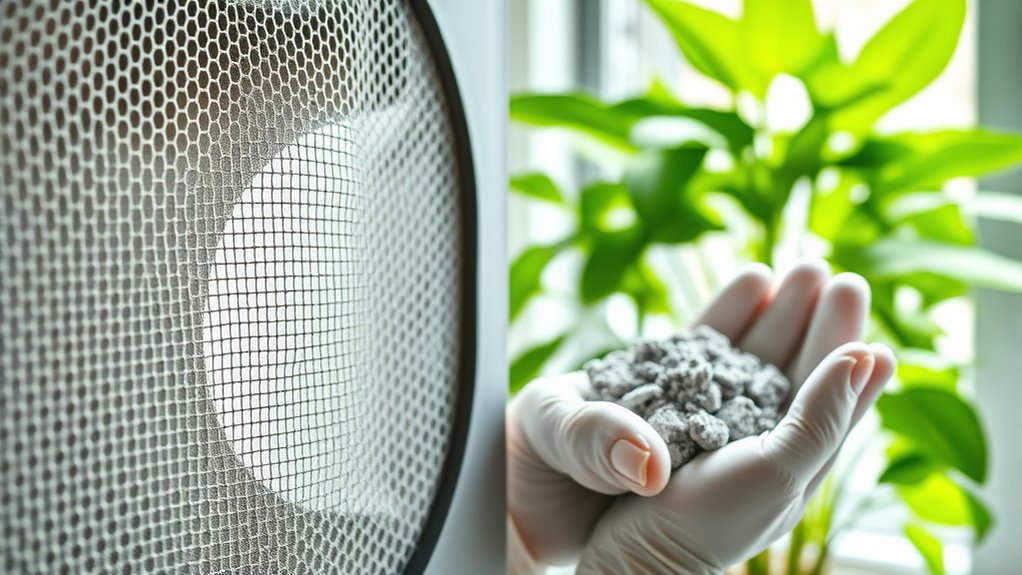
While you might not think twice about disposing of your HEPA filter, it’s essential to reflect on the environmental implications of this seemingly simple task. HEPA filters are made from non-biodegradable materials, which can linger in landfills and pose an environmental concern. Improper disposal can release trapped pollutants, harming air and soil quality. Most HEPA filters can’t be recycled, but some manufacturers provide eco-friendly options or recycling programs for proper disposal. By using responsible disposal practices, you can help prevent the release of up to 99% of trapped pollutants into the environment.
| Disposal Method | Environmental Impact | Recommendations |
|---|---|---|
| Regular Trash | Non-biodegradable waste | Follow local guidelines |
| Recycling Programs | Reduced landfill waste | Check with manufacturers |
| Eco-friendly Filters | Lower pollution risk | Invest in sustainable options |
| Proper Containment | Protects soil quality | Seal filters before disposal |
| Community Programs | Promotes awareness | Participate in local drives |
Tips for Extending the Life of Your HEPA Filter
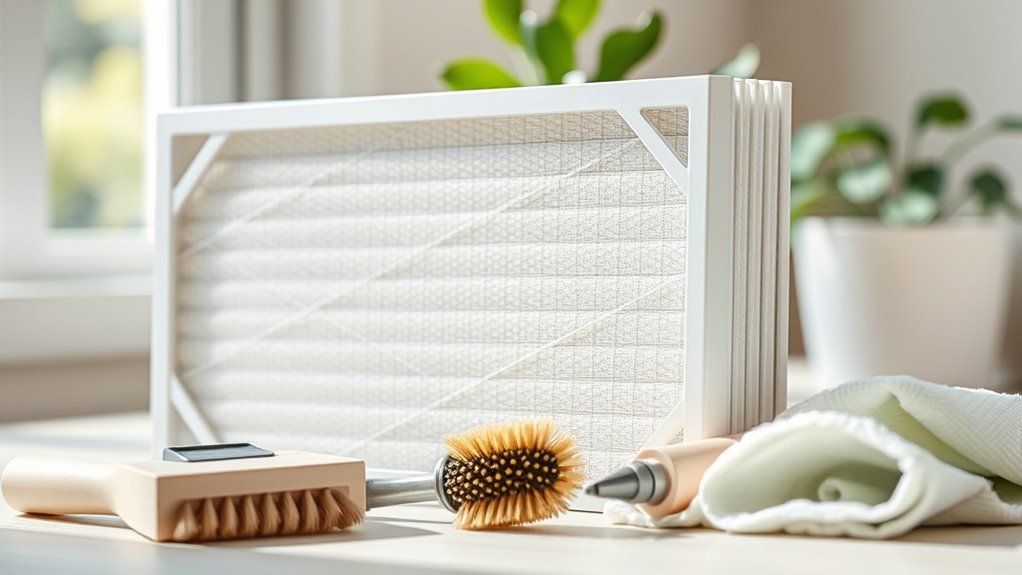
To get the most out of your HEPA filter, it’s crucial to adopt some simple yet effective strategies.
By following these tips, you can enhance the lifespan of your HEPA filters and improve your air purifier’s performance:
- Regularly monitor your air purifier’s performance and replace HEPA filters every 6 to 12 months.
- Use pre-filters to capture larger particles before they reach the HEPA filter.
- Keep the air purifier clean and free of debris by vacuuming the exterior and cleaning accessible parts.
- Avoid placing the air purifier in high dust or moisture areas and run it at lower speeds when air quality is good.
These maintenance tips can greatly extend the life of your HEPA filter, ensuring cleaner air for you and your family.
Frequently Asked Questions
What Is the Recommended Maintenance of the HEPA Filter?
To maintain your HEPA filter effectively, inspect it every 1 to 3 months for dirt, clogging, or damage.
Replace prefilters every 3 to 6 months to prolong the HEPA filter’s life.
Vacuum the exterior gently to remove loose particles, but be careful not to damage it.
Generally, you should replace the HEPA filter every 6 to 12 months, or more frequently in highly polluted areas—sometimes as often as every 3 months.
How Often Should HEPA Filters Be Changed?
When it comes to HEPA filters, you should change them regularly to keep things running smoothly.
Generally, aim to replace them every 6 to 12 months. If you’re living in a polluted area or have pets, you might find yourself swapping them out every 3 months.
In cleaner spaces, they can last up to 2 years. Just keep an eye out for signs like decreased airflow or unpleasant odors to know when it’s time.
How Do You Know if a HEPA Filter Needs Replacing?
To know if your HEPA filter needs replacing, watch for a few key signs.
If you notice decreased airflow or hear increased noise from your air purifier, it’s time to check the filter.
Visible dirt or discoloration is another clear indicator.
Also, if unpleasant odors or allergy symptoms worsen, your filter might be clogged.
Keep an eye on your energy bills; a spike could mean your filter’s efficiency is dropping.
What Are the Rules for HEPA Filters?
When it comes to HEPA filters, you should remember a few key rules.
First, make sure your filter meets the standard by capturing at least 99.97% of particles at 0.3 microns.
Check it regularly for dirt or damage, ideally every 6 to 12 months.
Replace it when you notice reduced airflow or visible dirt.
Finally, dispose of used filters in regular trash, as they’re typically non-biodegradable and may contain trapped pollutants.
Conclusion
To sum up, taking care of your HEPA filter is essential for maintaining clean air in your home. Did you know that a well-maintained HEPA filter can capture up to 99.97% of airborne particles as small as 0.3 microns? By following the maintenance tips and knowing when to replace your filter, you’ll not only improve your indoor air quality but also extend its lifespan. Don’t overlook this simple yet effective way to breathe easier and keep your environment healthy!
